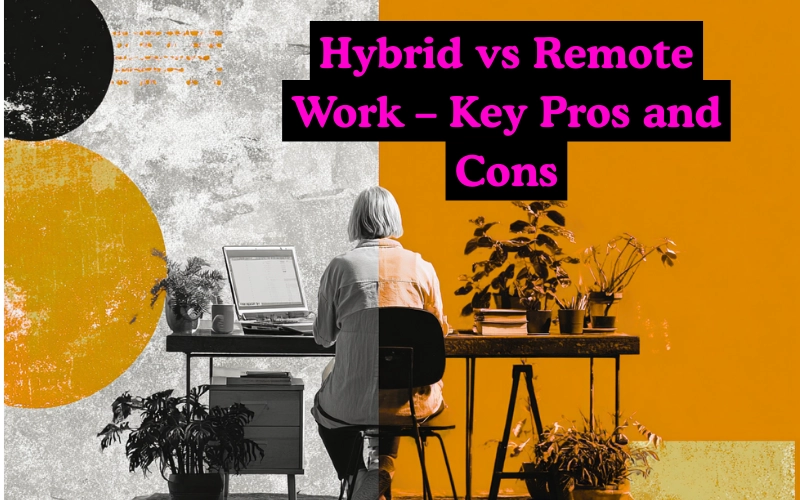The debate is OVER.
Well, that’s what your CEO wants you to believe when they mandate three days in the office “for collaboration” while secretly working from their beach house every Friday.
And it’s what the fully-remote evangelists preach while conveniently forgetting to mention their 3am Slack anxiety and the fact they haven’t worn real pants since 2021.
Here’s what nobody’s telling you about the hybrid vs. remote battle:
You’re asking the wrong damn question.
It’s not about which model is “better.” It’s about which trade-offs you’re willing to LIVE with every single day. Because both options come with a price tag that has nothing to do with your salary.
The remote crowd will sell you on freedom, flexibility, and no commute. The hybrid enthusiasts promise the best of both worlds – human connection AND pajama Tuesdays.
But after analyzing how hundreds of companies have navigated this transition (and personally experiencing both sides of this coin), I’ve noticed something fascinating:
The people who thrive aren’t picking based on the PROS.
They’re choosing based on which CONS they can actually stomach long-term.
So let’s cut through the corporate speak and LinkedIn humble-brags to examine what you’re REALLY signing up for with each model.
What is Remote Work?

Remote work means running your entire professional life from wherever you damn well please. Your kitchen table, a beachside café, your childhood bedroom – anywhere with WiFi becomes your office. No commute, no cubicle, no awkward elevator small talk. Just you, your laptop, and the FREEDOM to work in yesterday’s pajamas.
The Pros of Remote Work

- No Commute = Reclaimed LIFE: Those two hours daily? That’s 500 hours yearly you’re NOT sitting in traffic contemplating your existence. That’s literally three weeks of your life back.
- Geographic Freedom: Live in San Francisco while earning San Francisco wages? Or live in Iowa with those SAME wages? Your mortgage payment just got interesting.
- Deep Work Paradise: No drive-by desk visits. No “quick questions” that steal 45 minutes. Just you and actual focused work time.
- Customized Environment: Hate fluorescent lights? Work by candlelight. Need complete silence? Get it. Want death metal blasting? Your neighbors might complain, but your boss won’t.
- Better Work-Life Integration: Throw in laundry between calls. Walk your dog at lunch. Actually BE there when your kids get home from school.
The Cons of Remote Work

- Isolation Hits DIFFERENT: That introverted paradise you dreamed of? It becomes solitary confinement real quick. You’ll find yourself having full conversations with your houseplants by week three.
- Career Advancement Limbo: “Out of sight, out of mind” isn’t just a saying. While you’re crushing deliverables, office folks are crushing happy hours with leadership.
- The Always-On Trap: Your bedroom is your office. Your office is your bedroom. When exactly does work END? Spoiler: It doesn’t.
- Communication Breakdown: Every. Single. Thing. Requires. A. Meeting. That quick hallway chat? Now it’s a 30-minute Zoom call with calendar gymnastics.
- Self-Discipline or Die: Nobody’s watching if you’re actually working or deep in a Netflix binge. That freedom you wanted? It requires superhuman self-control.
What is Hybrid Work?
Hybrid work is the corporate world’s attempt at having its cake and eating it too. You get SOME office face-time (usually Tuesdays through Thursdays) and SOME couch time. It’s the “we’re flexible but not THAT flexible” approach that makes everyone equally unhappy. Or equally happy. Depends who’s asking.
Hybrid Work Models
The 3-2 Split (The Classic)
Three days office, two days home. Usually Tuesday through Thursday in-person because apparently Monday and Friday don’t count as “real” work days anymore.
The 2-3 Flip (Remote-Leaning)
Two days office for “collaboration,” three days home for “deep work.” Perfect for people who’ve calculated the EXACT minimum office presence needed to stay relevant.
Week-by-Week Rotation
One week fully remote, next week fully in-office. Like custody arrangements but for your sanity.
Team-Specific Schedules
Marketing comes in Mondays, Engineering on Wednesdays, Sales whenever they feel like it. Chaos disguised as flexibility.
Core Hours Hybrid
Be in office 10am-2pm, do whatever before and after. Because apparently all meaningful work happens during lunch hours.
Monthly Minimums
Come in 4-8 days per month, you choose when. The “we trust you but also we’re counting” model.
The Pros of Hybrid Work
- Best of Both Worlds (Theoretically): Deep work from home Monday, brainstorm in-person Tuesday. You get variety without the full commitment to either extreme.
- Actual Human Connection: Those Zoom relationships? They hit different when you’ve actually MET the person. Water cooler chat still beats Slack threads for building real trust.
- Flexibility with Structure: Not disciplined enough for full remote? Not masochistic enough for full office? Hybrid’s your goldilocks zone.
- Reduced Commute Pain: Two or three commutes weekly feels manageable. You might even MISS the podcast time. (You won’t miss the parking fees though.)
- Office Perks, Part-Time: Free coffee and snacks haven’t disappeared. Neither has that expensive standing desk. You just share them now.
- Easier Onboarding: New hires actually learn the culture instead of guessing it from carefully curated Zoom backgrounds.
The Cons of Hybrid Work
- The Worst Commute Math: Paying full price for parking/transit passes to use them 60% of the time. Your wallet hurts AND you still have to wake up early sometimes.
- Hot Desk Hell: Remember “your” desk? It’s gone. Now you’re fighting for the good spots like it’s musical chairs for adults.
- Two-Tier System: Tuesday’s in-office crew makes decisions. Wednesday’s remote folks find out later. “Hybrid equality” is corporate fiction.
- Half-Empty Offices: You commuted for “collaboration” but your team chose different days. Congrats, you’re alone in an office instead of at home.
- The Gear Shuffle: Laptop, charger, mouse, coffee mug – your life is now about remembering what’s WHERE. You’ll buy duplicates of everything.
Hybrid vs Remote Work – What Data Says?
👉 87% of workers embrace hybrid when offered – they’ll take flexibility in ANY form over none at all. (McKinsey, 2023)
👉 Remote workers save $12,000 annually on commuting, food, and those “work clothes” you pretend you need. (FlexJobs, 2023)
👉 65% of employees want full-time remote but only 32% of companies plan to offer it. Someone’s NOT reading the room. (Gallup, 2023)
👉 Hybrid workers spend 1.5 days more in office than required because FOMO is real and promotion anxiety is realer. (Microsoft Work Trend Index, 2023)
👉 Productivity increased 13% for remote workers in controlled studies. Turns out people work better without Dave’s loud speakerphone calls. (Stanford Study, 2023)
👉 54% of remote workers feel less connected to company culture – those virtual happy hours aren’t fooling anyone. (Buffer State of Remote Work, 2023)
👉 Hybrid arrangements reduce quit rates by 35% because people really hate ultimatums. (Owl Labs, 2023)
👉 Office attendance peaks at 49% on Tuesdays and drops to 29% on Fridays. Monday and Friday are basically remote days now. (Kastle Systems, 2024)
👉 Remote job postings get 2.8x more applicants than in-office roles. The talent has spoken with their applications. (LinkedIn Global Talent Trends, 2023)
👉 73% of executives think office presence impacts promotions while pretending it doesn’t. The quiet part said out loud. (KPMG CEO Outlook, 2023)
Hybrid vs Remote Work Compared
How to Choose What’s Best For You?
Your Industry Matters
Tech companies worship remote work. Law firms pretend it doesn’t exist. Healthcare needs bodies present. Finance wants you where they can SEE you counting their money. Know your industry’s unspoken rules before fighting them.
Team Distribution Decides Everything
If 80% of your team is remote, that hybrid mandate becomes expensive theater. If everyone’s local, full remote makes you the perpetual outsider. Follow the critical mass.
Your Real Estate Reality
Signed a 10-year lease in 2019? Hybrid’s your cope. Running fully distributed? Remote saves you millions. Sometimes the decision’s already MADE by your P&L.
Talent Competition
Competing with Google for engineers? Better offer remote. Hiring local retail managers? Hybrid works fine. Your talent pool determines your flexibility.
Leadership Comfort Level
Your CEO golfs every Friday but wants butts in seats? That’s hybrid. Your founder lives in Bali? Welcome to remote life. Leadership lifestyle predicts company policy.
Wrap Up
The hybrid versus remote debate isn’t ending anytime soon.
Both models work. Both models fail. The difference isn’t in the MODEL – it’s in the execution and honesty about trade-offs.
Remote work offers ultimate flexibility but demands ultimate self-discipline. Hybrid promises balance but often delivers complexity. Neither is perfect because perfect doesn’t EXIST in the messy reality of human work.
The winner? Whatever model you can execute consistently without lying to yourself about its limitations. Pick your poison, own the consequences, and stop pretending there’s a perfect answer.
Your ideal setup exists. You just have to be honest about what you’re willing to sacrifice to get it.
Ben doesn’t buy into “the way it’s always been done.” He’s spent his career challenging hiring norms and rethinking how remote work should feel. At Remployee, he helps create honest tools and opportunities for people tired of the gig economy’s empty promises.



